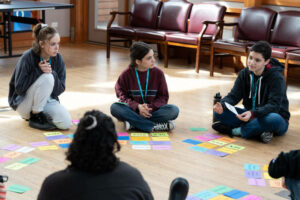
The Jewish Federation’s Commitment to LGBTQ+ Inclusion
Being a teenager is notoriously difficult. Being a teenager struggling to figure out their gender identity and sexual orientation is even harder.
For Gila Axelrod, 25, the programming offered by Moving Traditions — a grantee of the Jewish Federation of Greater Philadelphia — has been an oasis in the chaos, both back when she was a teenager and even now, as she serves as a mentor for those with similar struggles.
“It was really special to have that Jewish community, that group of people who all cared about each other. I knew I could go to them every month to ground me throughout that time of transition,” said Axelrod, who currently serves as a leader of one of Moving Traditions’ Rosh Hodesh groups.
Designed specifically for young women and nonbinary teenagers, the Rosh Hodesh groups provide opportunities to discuss current issues and personal problems through the lens of Jewish teachings.
“Being the leader of this group that I was once a member of, it feels like such a full circle moment,” noted Axelrod, whose group also includes her own sibling. “It is beautiful to have these ancient teachings and wisdoms that can apply to our lives and can guide us through difficult things that we experience today.”
Moving Traditions aims to embolden Jewish youth to thrive through the pursuit of personal well-being (shleimut), caring relationships (hesed) and a Jewish and feminist vision of equity and justice (tzedek).
“Today’s teens know all too well that there are powerful forces that seek to roll back the advances that have been made for women and LGBTQ+ folks,” stated Moving Traditions’ Chief Program Officer Rabbi Tamara R. Cohen, who recently received the prestigious Covenant Award. “Our programs support our teens in expressing the impact of these forces on their lives and in pushing back against them. We encourage them to develop a proudly Jewish and feminist vision for justice and to begin to explore the roles that they can play in advancing social change.”
When Rabbi Cohen started working at Moving Traditions nine years ago, one of her goals was to ensure that LGBTQ+ teens were well-served by the organization, in part because of her own experiences as a teen who was not sure there would be room for her in the Jewish community if she came out.
In addition to the Rosh Hodesh groups, Moving Traditions’ programming includes 18 Tzelem groups across the country for nonbinary, transgender, gender expansive and other LGBTQ+ teens — including one group that operates locally in partnership with the Jewish Family and Children’s Service of Philadelphia — and Shevet groups for boys and teens exploring their gender identities.
“Being a queer woman and growing up not really knowing many queer people, I know how crucial it is for teens nowadays to have that representation and have someone they can trust and talk to about their identities,” Axelrod expressed. “I want to make sure they see queer adults who are living their lives proudly and joyfully.”
According to the Jewish Federation’s population study from 2019, one in 10 Jewish households in the Greater Philadelphia area have an individual who identifies as LGBTQ+.
“Members of the LGBTQ+ community have historically been marginalized and underrepresented, and it is a priority of the Jewish Federation to make them feel welcomed and that they belong here,” stated Jewish Federation’s Director of Local Grants and Partnerships Brian Gralnick. “Both internally, through our hiring practices, and externally, in the programming we fund, we strive to empower members of the LGBTQ+ community.”
As part of this commitment, the Jewish Federation granted $586,665 last year from the Jewish Community Fund — the Jewish Federation’s largest campaign where donations are allocated to where the need is greatest — to local and international organizations that work with historically disconnected groups. Moving Traditions was one of these grantees. This funding in total impacted 2,962 persons with disabilities, 2,109 LGBTQ+ individuals and 48,530 Ethiopian, Russian-speaking and Bedouin Israelis, among others.
“We are grateful to the Jewish Federation of Greater Philadelphia for their generous ongoing support,” added Rabbi Cohen. “They’ve been there for us from the very beginning, when we only offered Rosh Hodesh for girls, and their support has grown as we have expanded our programmatic offerings.”
For Axelrod, having this support system in her youth ensured her future involvement in the Jewish community and granted her a sense of belonging and a pride in her identity, something she tries to encourage in the teenagers she mentors.
“Having this space where Jewish values and ideas and traditions were blended with things that were relevant to me at the time allowed me to keep Judaism in my life while I was busy with other extracurriculars,” she noted. “I try to incorporate holiness and queerness in my Rosh Hodesh group by explaining that every single person is made in the image of G-d and that every single person is holy, and that being in touch with your identity and yourself, especially at such a young age, is something to be proud of and something to be celebrated.”
***
The Jewish Federation is committed to creating a welcoming, inclusive community for all. To learn about our impact in Greater Philadelphia, Israel and overseas, visit jewishphilly.org/impact.



